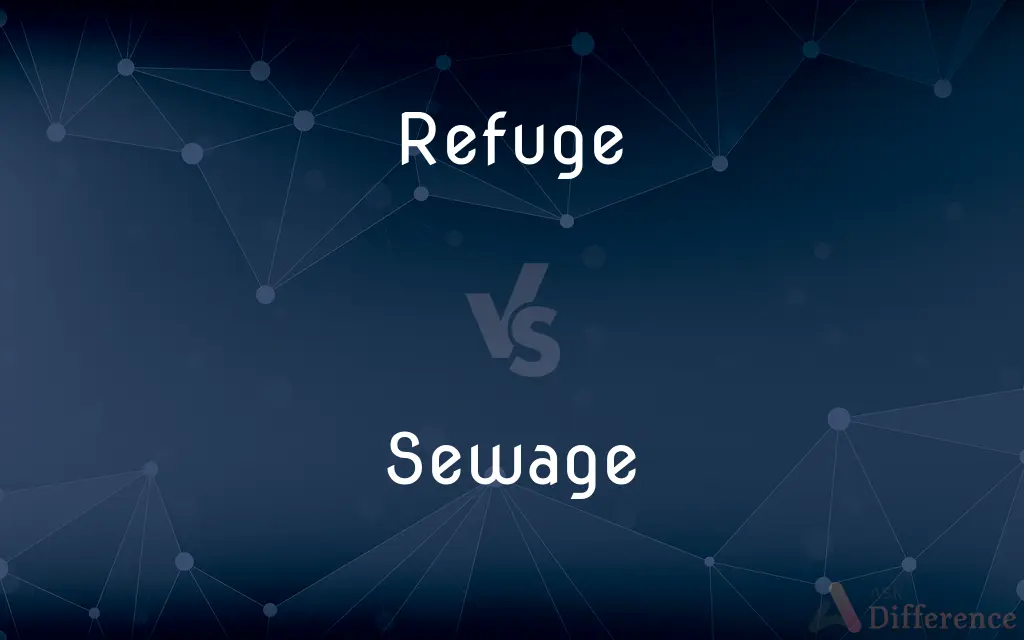Refuge vs. Sewage — What's the Difference?
Edited by Tayyaba Rehman — By Fiza Rafique — Updated on April 26, 2024
Refuge refers to a place of safety or sanctuary, offering protection from danger or distress; sewage, on the other hand, is waste water and excrement conveyed in sewers, requiring treatment due to health risks.

Difference Between Refuge and Sewage
Table of Contents
ADVERTISEMENT
Key Differences
Refuge implies a place or state of safety and protection, often used in contexts of escape from conflict or natural disasters. Whereas sewage denotes waste material, especially dirty water and excrement, transported through sewers from residences and industries.
While the concept of refuge provides a positive, protective connotation, emphasizing shelter and safety, sewage is associated with waste management challenges, focusing on sanitation and environmental health.
Refuge is critical in emergency management, humanitarian efforts, and wildlife conservation, offering shelter and security. On the other hand, effective sewage management is essential for urban planning, public health, and environmental protection.
The management of refuges involves the maintenance of facilities and provision of resources to support life, often in crisis situations. In contrast, sewage management involves infrastructure such as sewage treatment plants and disposal systems to ensure community health and ecological balance.
Refuges can be natural or man-made, ranging from mountain shelters to designated wildlife sanctuaries. Sewage systems, however, are entirely man-made, designed to handle and treat wastewater to prevent contamination and disease.
ADVERTISEMENT
Comparison Chart
Definition
Place of safety and protection
Wastewater and excrement in sewers
Primary Function
Shelter and security
Sanitation and waste disposal
Associated Fields
Emergency management, conservation
Environmental engineering, public health
Infrastructure Type
Natural or man-made shelters
Man-made treatment and disposal systems
Public Perception
Generally positive, associated with safety
Often negative, associated with waste and odors
Compare with Definitions
Refuge
Shelter from danger or hardship.
The mountain cabin served as a refuge for the stranded hikers.
Sewage
Wastewater and excrement conveyed in sewers.
The city's sewage system is undergoing major renovations.
Refuge
A place that provides protection for endangered species.
The wildlife refuge houses numerous protected animals.
Sewage
The system of pipes and channels carrying sewage.
Blockages in the sewage can cause serious hygiene issues.
Refuge
Something providing safety.
The embassy grounds are a refuge for those seeking asylum.
Sewage
The infrastructure involved in sewage disposal.
Engineers are working to expand the sewage capacity of the town.
Refuge
Temporary accommodations for displaced individuals.
Local schools have been turned into refuges after the earthquake.
Sewage
The waste matter transported in these systems.
Treating sewage is essential to prevent environmental pollution.
Refuge
An area where persecuted people can find safety.
The city was known as a refuge for political dissidents.
Sewage
Material that must be treated to prevent contamination.
Modern sewage treatment plants are highly efficient.
Refuge
Protection or shelter, as from danger or hardship
Sought refuge from the storm in a cabin.
Sewage
Sewage (or domestic sewage, domestic wastewater, municipal wastewater) is a type of wastewater that is produced by a community of people. It is characterized by volume or rate of flow, physical condition, chemical and toxic constituents, and its bacteriologic status (which organisms it contains and in what quantities).
Refuge
A place providing protection or shelter
A colony that was a refuge for religious nonconformists.
Sewage
Liquid and solid waste carried off in sewers or drains.
Refuge
An undeveloped area for the preservation of animals and plants.
Sewage
A suspension of water and solid waste, transported by sewers to be disposed of or processed.
Refuge
A source of help, relief, or comfort in times of trouble
"Reva's love was her refuge from shame and degradation" (Richard Wright).
Sewage
(obsolete) sewerage.
Refuge
A state of safety, protection or shelter.
Sewage
The contents of a sewer or drain; refuse liquids or matter carried off by sewers
Refuge
A place providing safety, protection or shelter.
Sewage
Sewerage, 2.
Refuge
Something or someone turned to for safety or assistance; a recourse or resort.
Sewage
Waste matter carried away in sewers or drains
Refuge
An expedient to secure protection or defence.
Refuge
A refuge island.
Refuge
(intransitive) To return to a place of shelter.
Refuge
To shelter; to protect.
Refuge
Shelter or protection from danger or distress.
Rocks, dens, and caves! But I in none of theseFind place or refuge.
We might have a strong consolation, who have fled for refuge to lay hold upon the hope set before us.
Refuge
That which shelters or protects from danger, or from distress or calamity; a stronghold which protects by its strength, or a sanctuary which secures safety by its sacredness; a place inaccessible to an enemy.
The high hills are a refuger the wild goats.
The Lord also will be a refuge for the oppressed.
Refuge
An expedient to secure protection or defense; a device or contrivance.
Their latest refugeWas to send him.
Light must be supplied, among gracefulrefuges, by terracing story in danger of darkness.
Refuge
To shelter; to protect.
Refuge
A safe place;
He ran to safety
Refuge
Something or someone turned to for assistance or security;
His only recourse was the police
Took refuge in lying
Refuge
A shelter from danger or hardship
Refuge
Act of turning to for assistance;
Have recourse to the courts
An appeal to his uncle was his last resort
Common Curiosities
Can a refuge be a permanent solution?
Refuges are usually temporary, although some, like wildlife refuges, are permanent.
What is the main purpose of a refuge?
To provide safety and protection from danger or distress.
What are the environmental impacts of improper sewage management?
It can lead to water pollution, health hazards, and environmental degradation.
What is the significance of sewage treatment?
To prevent disease, protect water resources, and support public health.
What happens to sewage after treatment?
Treated water is often returned to the environment or reused in various ways.
How does the function of a refuge differ from that of a sewage system?
A refuge provides protection and shelter, while a sewage system manages waste and sanitation.
What types of refuges exist?
Emergency shelters, wildlife sanctuaries, and protected areas for persecuted individuals.
How do modern cities handle sewage efficiently?
Through advanced sewage treatment technologies and comprehensive waste management systems.
Can anyone access a refuge?
Access depends on the type of refuge and the situation, but many are open to those in need.
What role does a refuge play in wildlife conservation?
It provides a safe habitat for endangered or threatened species.
How is sewage typically handled?
Through a system of sewers and treatment plants to manage and clean wastewater.
What facilities are typically found in a refuge?
Basic amenities such as food, water, and sometimes medical care.
What are the challenges in sewage management?
Infrastructure maintenance, handling capacity, and technological updates.
Share Your Discovery

Previous Comparison
Kabob vs. Kebab
Next Comparison
Holograph vs. HologramAuthor Spotlight
Written by
Fiza RafiqueFiza Rafique is a skilled content writer at AskDifference.com, where she meticulously refines and enhances written pieces. Drawing from her vast editorial expertise, Fiza ensures clarity, accuracy, and precision in every article. Passionate about language, she continually seeks to elevate the quality of content for readers worldwide.
Edited by
Tayyaba RehmanTayyaba Rehman is a distinguished writer, currently serving as a primary contributor to askdifference.com. As a researcher in semantics and etymology, Tayyaba's passion for the complexity of languages and their distinctions has found a perfect home on the platform. Tayyaba delves into the intricacies of language, distinguishing between commonly confused words and phrases, thereby providing clarity for readers worldwide.
















































